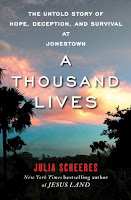Something is wrong with me, I know.
Anyway, so I have a weird fascination with religions and most notably, cults. I remember reading a ton about Islam and about Latter-day Saints, and then about Fundamental Latter-day Saints. I don't know why, per say, but something about a group of people believing in something greater than themselves and these beliefs govern their daily lives just fascinates me.
When I spotted this book in Audible, it reminded me of this story a family friend, Linda, told me. She grew up in Northern California, and would go horse back riding on a daily basis. She would ride her horse close to where the Peoples Temple Communes were located, but she didn't realize it at the time.
So of course I get the book about Jim Jones, The Peoples Temple and the demise of Jonestown. Because of course I do.
So of course I get the book about Jim Jones, The Peoples Temple and the demise of Jonestown. Because of course I do.
In the beginning of the book, it's a bit hard to follow. Scheeres just jumps right in by introducing a teenager by the name of Tommy arrives to Jonestown to finally see his father after what appears to be several months of being separated. Even though there are four main characters that are followed throughout the book, she doesn't stick with them, drifting in and out between the many people who made up The Peoples Temple.
What I also found a bit hard to swallow was just how much of her personal self and emotions she put into the book. It's a fictionalized account from her extensive research, a fact she doesn't try to hide but she emotes what Jim Jones thinks and feels, along with other characters as well, which is a bit too omnipresent for my own personal tastes.
For half of the book, she shows the buildup of Jim Jones popularity, which at the time, I found a bit boring. At first, I thought, oh... Jim Jones just wants equality and Harvey Milk dug him? Ok then.
Then the tides turned when the author peeled back more and more layers. The twisted and psychological mind games that Jim Jones played with his believers were terrifying like a train flying full speed into the dark, dark tunnel of Jonestown,
The last few chapters detailing the end of Jonestown, with Jim Jones descending into madness with his addiction to drugs and obsession with death shook me to the core. What turned from a Congressman checking in on his constituents into a man's last power play almost seems laughably plausible.
Throughout the book, I wanted to yell at them to run and that commanding people to write letters incriminating themselves is not a normal thing to do, and fervent tests of loyalty are also not a normal thing to do! That it's ok to back out! Don't be afraid!
I always assumed that people that were sucked into cults were gullible and devoid of critical thinking skills. However, this story, despite the author's own embellishment, shows a group of people, mostly the disenfranchised, who wanted equal rights. They wanted to help make the world a better place, and at first glance, a white man who also believed that seems to be a powerful way to go.
What also hit me hard was the story of Edith Roller because I saw myself the most in her. She was a well-educated, white woman who valued her privacy but also had a strong desire to succeed, and to use her talents for the greater good. She was in the military, and then worked for the CIA. She doesn't fit the profile for someone who would willingly follow Jim Jones into death.
It really brings it into perspective on psychopaths who use what people wish for the most to control, manipulate and gain power. Especially now, where the world is changing and all people want is for it to be better... is it so easy to tell the good guys from the bad guys?
Jim Jones started out as a man who would fight for the end of racism and promoted living in a perfect world. Politicians in California loved him and counted on his influence. He had a "rainbow family" and adopted an African American boy, and gave him his namesake, something unheard of at the time. He staged rallies, and protest, and preached about God's love and will, and about equal rights for all.
He tricked people into thinking he could heal them. He started asking for their money, and then even more of their money. He coerced people into blinding following him by intimidation, guilt, love and hope.
In this election year, where there are so many rising stars, both loved and hated... Do we truly know who the good guys are? I think about this question a lot.
Weirdly enough, I would like to see Jonestown. It's in ruins and the Guyanese government toyed with the idea of turning it into a dark tourist site where people could stay the night to get the experience of Jonestown.
Couldn't they take a page from the concentration camp memorials?
I would've liked to say that I would be interested in reading other accounts and stories of Jim Jones... but I think one book is enough.


No comments:
Post a Comment